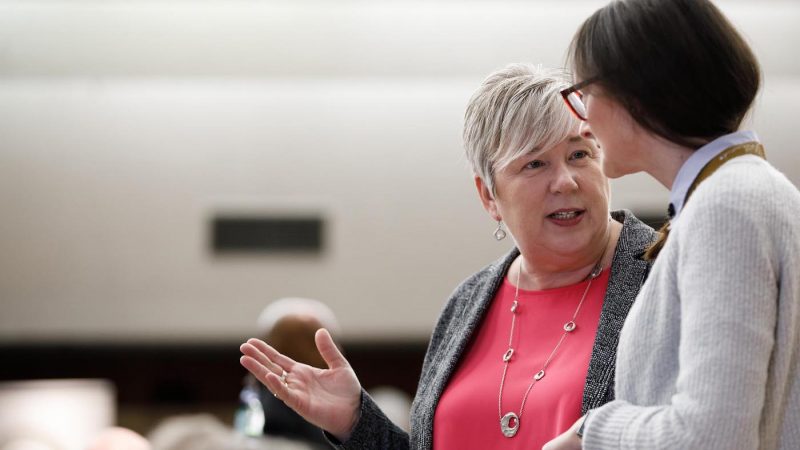Canada’s Fisheries Minister clarifies her B.C. aquaculture mandate
“The mandate letter is clear that I have to come up with a plan by 2025 and that’s what I will be doing,” – Minister of Fisheries, Bernadette Jordan.
By Fabian Dawson
SeaWestNews
Canada’s newly minted Minister of Fisheries, Bernadette Jordan estimates that it will take about five years to come up with a plan to phase out open-net aquaculture on British Columbia’s coast – a pledge her Liberal party made during the last election campaign.
In an interview with SeaWestNews, Jordan said the 2025 deadline in her mandate letter is the date to “come up with a plan” and is not about getting all open-net salmon farms out of the ocean in five years.
“The mandate letter is clear that I have to come up with a plan by 2025 and that’s what I will be doing,” Jordan told SeaWestNews during her first visit to B.C as Minister of Fisheries, Oceans, and the Canadian Coast Guard.
After the Liberals were returned to power as a minority government last year, Trudeau mandated Jordan to “work with the province of British Columbia and Indigenous communities to create a responsible plan to transition from open net-pen salmon farming in coastal British Columbia waters by 2025.”
This led to some referring to the date as the time all ocean-pen fish farms in B.C. will be move into closed tanks on land.
Four years ago, the Trudeau-led Liberal party armed with a huge majority in Parliament, decreed there is no reason to shut down open-net salmon farming in Canada, in response to a petition to shut down the industry by the anti-fish lobby.
“Legislating the removal of salmon aquaculture from Canada’s oceans represents an excessive approach to resolving environmental issues that are already being managed through robust, science-based federal and provincial regulations,” it said.
“Removing salmon aquaculture from the marine environment would threaten thousands of jobs, most of them located in rural, remote and coastal areas hard-hit by downturns in other resource industries,” the government said.
Last year, the same Trudeau-led Liberal party, reversed its decree and made an election campaign pledge to phase out ocean net pen salmon farming in B.C. by 2025.
This new mandate, will adversely impact over 7,000 sustainable livelihoods, mostly in B.C.’s coastal and indigenous communities, said the industry.
In addition, 20 BC First Nations have partnership agreements for farming salmon in their territory resulting in 78% of all salmon farmed in the province falling under a beneficial partnership with a First Nation.
Jordan told SeaWestNews that she expects to have a clearer timeline and consultation pathway on the issue after the public release of a report – State of Aquaculture Technologies – which examined the viability of production systems with the potential to deliver market-sized salmon in B.C.
The technology study, originally supposed to be made public last summer, looked at land-based recirculating aquaculture systems (RAS), hybrid systems to grow juvenile fish in RAS and then maturing in ocean-based farms, floating closed containment farms and offshore ocean-based open farms.
A draft copy of the study concludes that ‘the new technologies discussed in this report, as well as conventional net pen systems, will all play a role in contributing to global production of salmon products’.
Jordan stressed that the government is committed to science-based decision making, the United Nations Declaration on the Rights of Indigenous Peoples or UNDRIP for shared prosperity with First Nations and the economic well-being of coastal communities.
“When we look at the mandate letter and the commitments that have been put on me to make, I think it’s really important to look at the (proposed) Aquaculture Act and how we go forward with that to lend stability to the industry and indigenous and coastal communities,” said Jordan.
“Our commitment is to the health of the oceans and making sure we do everything we have to do so we can keep it healthy,” she added.
The Canadian Aquaculture Industry Alliance (CAIA) in welcoming Jordan as the new federal Minister of Fisheries, has expressed its enthusiasm to work together to realizing the opportunities for Canada through aquaculture development.
“Seafood farming is a key driver of economic growth in Canadian rural, coastal and indigenous communities, and is the fastest growing food production sector globally. We look forward to working to develop a strong partnership with Minister Jordan to help Canada’s aquaculture sector thrive,” said CAIA President and CEO Timothy Kennedy.
CAIA members generate over $5 billion in economic activity, over $2 billion in GDP, and employ over 25,000 Canadians in the sustainable seafood farming sector in Canada.
Facebook image of Minister of Fisheries, Bernadette Jordan, speaking to a supporter.

